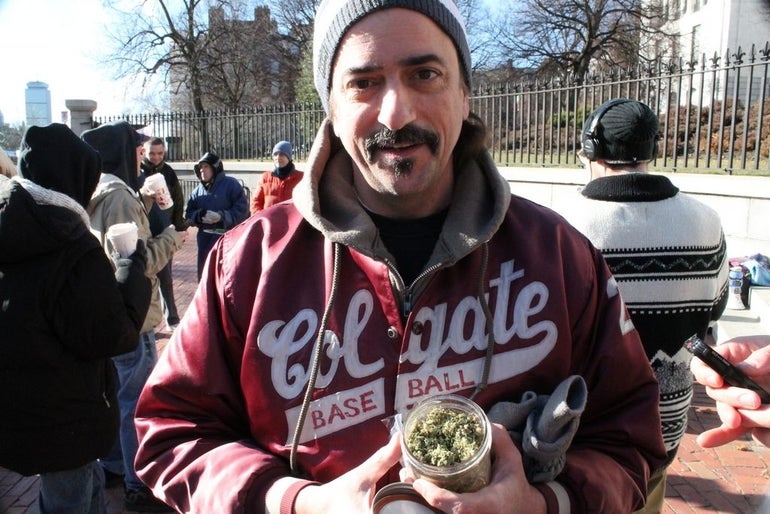Marijuana advocates spent millions of dollars to put a legal marijuana law in place in Massachusetts last year, and indicated Monday they are willing to spend more to protect the lawapproved by almost 1.8 million voters.
Beacon Hill leaders have made clear they intend to change the law — parts of which took effect in December, the rest delayed six months by the House, Senate and governor — and the committee in charge of making alterations to it is scheduled to hold its first hearing Monday.
Jim Borghesani, the communications director for the successful Yes on 4 campaign who now works with the Marijuana Policy Project, said the advocacy group is prepared to spend money in Massachusetts to make the case that legislative changes violate the voter-approved law.
“There is a chance on that,” Borghesani said when asked by a reporter if MPP might spend money on a “voter persuasion” effort. “We’ve already spent some money on social media targeting, which we think has been very effective; letting some members know exactly how their constituents feel.”
MPP is a 22-year-old organization focused solely on ending marijuana prohibition. MPP has three separate organizations focused on lobbying and ballot initiatives, education, and a political action committee that donates to congressional candidates. The organizations have a combined budget that usually exceeds $9 million. The policy project has about 40 employees and has lobbyists on retainers in state capitals.
While Senate President Stanley Rosenberg and House Speaker Robert DeLeo were contemplating which legislators to appoint to the new Joint Committee on Marijuana Policy, he said, legalization backers focused a stream of social media messages at them in an effort to influence the decisions.
“And you might see some other actions taken,” Borghessani added. “But until we see what comes out of the committee, we’ll have to wait and see.”
Borghesani and Yes on 4 campaign manager Will Luzier are now paid by the Marijuana Policy Project, a Washington, D.C.-based group that Yes on 4 counted as a “primary backer.” MPP gave more than $350,000 to the Yes on 4 group since mid-2014, according to state campaign finance records. At the end of 2016, Yes on 4 reported having $13,153 cash on hand.
Of greatest concern, Borghesani said, are changes to the law that would “violate the will of the voters.” Among those he listed as problematic Monday were allowing marijuana establishments to be prohibited from a town by a vote of the selectmen rather than town referendum, changing the legal age to buy, possess and use marijuana, and reducing the amount of marijuana an adult can grow at home.
DeLeo and Rosenberg on Monday defended the process they have set out for implementation of legal marijuana, pledging that any legislative changes will not prevent adults from legally buying marijuana.
“We will abide by the will of the voters and there will be the legal sale of marijuana in the state. Having said that, I think we do have some work to do relative to regulation, relative to taxation and the like,” the speaker said.
Among the possible changes to the law, the tax rate on sales appears most ripe for revision. The law established a 3.75 percent tax rate on marijuana sales, on top of the state’s 6.25 percent sales tax. Cities or towns have the ability to add their own 2 percent tax as well.
Gov. Charlie Baker, in an editorial board meeting with the MetroWest Daily News last month, outlined what he wants to see in a marijuana bill.
First, the governor expects expanded local control and favors a cap on the number of marijuana businesses in a given area to control density. Baker also supports determining an “upper end” for marijuana potency, typically measured by the amount of THC in the product.
Child safety regulations, specifically related to edible marijuana products, also rank on the governor’s wish list. He told the Daily News editorial board he wants to see “the subject of children eating edible marijuana products, like brownies or candies” settled. He also mentioned a regulatory system that can track marijuana from seed to final product.
Rosenberg, who had previously suggested the committee should look into raising the legal age to to use marijuana to 25 and reduce how much can be grown in homes, said he expects the committee’s work will be “fine tuning some items that are in there, again, without undermining the fundamental intent of the question.”
Committee co-chairs Rep. Mark Cusack and Sen. Patricia Jehlen said they are working with a June deadline to prepare an “omnibus bill.”

